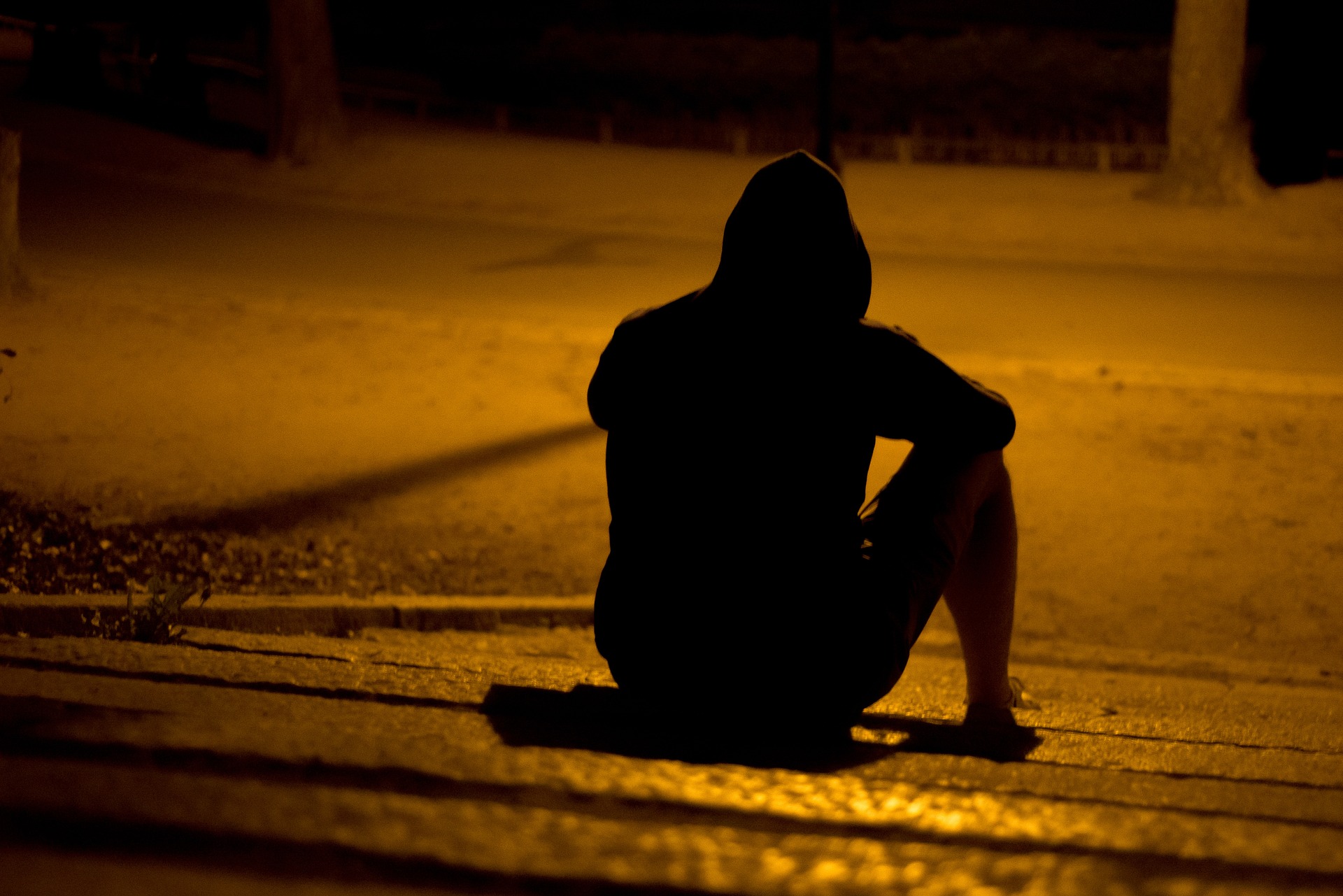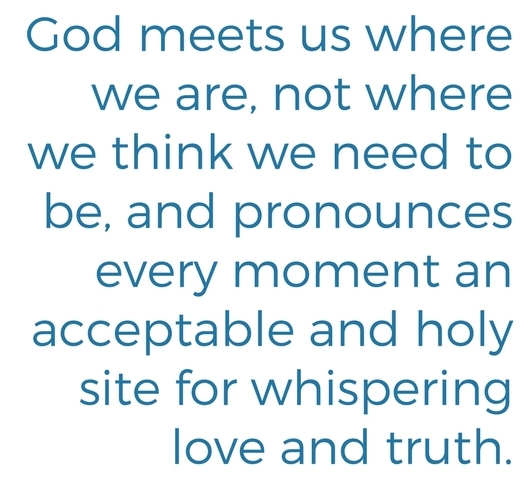This essay is by Maggi Van Dorn.
 I used to be quite frustrated that God never spoke directly to me the way She spoke to the Hebrew prophets. Or even in the way some charismatic Christians claim they interact with the divine—speaking in tongues, catching the holy spirit, or quaking in the pews. Had God gone dormant over the last 2,000 years? Or was I lacking the faithfulness or requisite mysticism to decipher that still small voice? And then I took a class on the 16th century Spanish mystic, St. John of the Cross. Most people might recognize John of the Cross by the famous expression he coined: the dark night of the soul. It referred to a period in the spiritual journey, when the mature, God-adoring mystic can no longer locate the source of her longing. The divine lover withdraws from the beloved and she is left in an empty and desolate darkness. It was John’s language of hunger, longing and loneliness that first spoke to me. Here was one of the most revered sages of the Catholic faith, who spent a lifetime penning poems of his love affair with God, admitting to a pained and prolonged silence. If St. John of the Cross could acknowledge this silence, and if over four hundred years later, St. Teresa of Calcutta’s diaries would reveal a similar loneliness, I could also rethink God’s communication style.
I used to be quite frustrated that God never spoke directly to me the way She spoke to the Hebrew prophets. Or even in the way some charismatic Christians claim they interact with the divine—speaking in tongues, catching the holy spirit, or quaking in the pews. Had God gone dormant over the last 2,000 years? Or was I lacking the faithfulness or requisite mysticism to decipher that still small voice? And then I took a class on the 16th century Spanish mystic, St. John of the Cross. Most people might recognize John of the Cross by the famous expression he coined: the dark night of the soul. It referred to a period in the spiritual journey, when the mature, God-adoring mystic can no longer locate the source of her longing. The divine lover withdraws from the beloved and she is left in an empty and desolate darkness. It was John’s language of hunger, longing and loneliness that first spoke to me. Here was one of the most revered sages of the Catholic faith, who spent a lifetime penning poems of his love affair with God, admitting to a pained and prolonged silence. If St. John of the Cross could acknowledge this silence, and if over four hundred years later, St. Teresa of Calcutta’s diaries would reveal a similar loneliness, I could also rethink God’s communication style.
 The “Speech” of God
The “Speech” of God
It was during my study of St. John of the Cross that I also encountered the words of his predecessor, St. Thomas Aquinas, who wrote of God’s language this way: “God speaks according to the mode of the receiver.” Or as I understood this—God speaks in the language of our own heart. God meets us where we are, not where we think we need to be, and pronounces every moment an acceptable and holy site for whispering love and truth. So the “speech” of God can look and sound like a lot of things. I’ve heard it from a friend on the phone, three thousand miles away, saying exactly what I needed to hear at that very moment. I’ve seen it in the faces of protesters who refuse to surrender hope or a vision of justice in the face of bigotry, violence and cynicism. And it’s not really about how the voice sounds or how the faces look. It’s the feeling it engenders within me. Something clicks. There is a sudden moment of recognition that what is happening is important, maybe even sacred, and that somewhere at the base of my gut, truth is being born.
And it’s not just any old feeling. We can experience many emotions throughout the day that are clues unto ourselves, but not necessarily revelatory of God’s will. The difference between my ordinary passions (which range from romantic to petty, anxious to hopeful) and holy connections is that the latter is often marked by synchronicity. To be clear, synchronicity, is a secular concept that was formally furnished by the 20th century psychoanalyst Carl Jung. It referred to the experience of finding relevant meaning between two otherwise disconnected and random events. While Jung’s concept of synchronicity did not rest on a belief in God, the idea lends fodder to our theological imaginations.
 Been Here Before
Been Here Before
The whole bundle of Hebrew and Christian scriptures is riddled with synchronicity and the church’s lectionary frequently reflects these divine call backs. For instance, if the Gospel reading has Jesus quoting Isaiah then the first reading will usually be that same passage in Isaiah. This not only enables the eternally distracted listener a chance to hear the chorus of the gospel message twice over, but it is designed to ritually reawaken us to something deeply buried in the memory of the church. It deliberately stimulates the feeling of déjà vu or the feeling of “haven’t we been here before?” And that déjà vu is critical to the life of faith. Without it, we would mostly stumble along as an eternally distracted, forgetful band of spiritual rookies, unaware of the enormous trust fund of scriptural wisdom we have inherited. And we are not the only humans who have struggled to find hope in the midst of darkness or to long for justice in times of corruption, greed and oppression. However, when we are personally or communally experiencing hardship it can easily feel all-consuming and beyond compare. It doesn’t matter how many people have endured the loss of a brother or sister, a parent or a child, a friend or a lover. Each death is excruciatingly singular. And yet, at the same time there is something in the collective consciousness of humanity that will resonate with our suffering. We are unrepeatable, fascinatingly unique creatures and we also share 99.9% of our genetic make-up. We are a peculiar paradox.
Yet, the scriptures remind us, through allusions to the past, that we are not alone in our struggles. In the gospel of Matthew, after John the Baptist is arrested, Jesus withdraws to Galilee and begins to assemble his ragtag crew of disciples, beginning with Peter and Andrew. Jesus’ physical relocation from Nazareth to Galilee isn’t random. It is meant, as the scriptures tell us, to recall the words of the prophet Isaiah:
Land of Zebulun and land of Naphtali,
the way to the sea, beyond the Jordan,
Galilee of the Gentiles,
the people who sit in darkness have seen a great light,
on those dwelling in a land overshadowed by death
light has arisen. (Mt 4:15-16)
We have been here before, maybe not as individuals, but as a beloved community that stretches across place and time. Notice also that God speaks not just through words, but through movement and action. We see this when Joseph takes the infant Jesus and his mother to Egypt to flee potential harm, thereby recreating the journey of the Hebrew people. And we see it here in the Gospels, where Jesus’ travels remind us of how God has repeatedly breathed new life into lands overshadowed by death and into people who were once captive to despair.
We have countless saints and mystics reminding us that God prioritizes love in action. St. Ignatius of Loyola wrote in his Spiritual Exercises that, “[L]ove ought to manifest itself in deeds rather than in words.” This is both an admonition for us to practice acts of love and a reminder that God shares the same preference for action when it comes to loving us. But since we are eternally distracted, forgetful people, God speaks through moments of synchronicity in our own lives. The uncanny familiarity we may feel when a friend speaks wise words, or in an encounter with a stranger, or in an act of hospitality, or in some seemingly random connection, may be an occasion for us to ask ourselves: Have I been here before? What truth can I recollect? How might I listen for divine resonances?
Maggi Van Dorn is the host and co-producer of The Interfaith Center of New York’s original podcast series “Interfaith Matters.” She holds a B.A. in Religious Studies from Santa Clara University and a Masters of Divinity from Harvard Divinity School. Currently, Maggi is the curator of Religion, Ethics and Spirituality content for SiriusXM’s forthcoming Project Orange.
Listen to an audio version of this post, narrated by Maggi…









Thank you for this beautifully written and easily accessible article. Best wishes Rachel
Why is God…”she”? I do not understand that? I’m reluctant to even read past that.
Bill – there are many images of God in the bible which refer to God caring for us like a mother hen, like a mother nurturing her child… God is neither male nor female, God gathers us up and nurtures us just as a mother nurtures her child. “As a mother comforts her child, so will I [God] comfort you; and you will be comforted over Jerusalem.” (Isa. 66:13) for example. Also Jesus himself used such an image “Jerusalem, Jerusalem, you who kill the prophets and stone those sent to you, how often I have longed to gather your children together, as a hen gathers her chicks under her wings, and you were not willing.” (Matthew 23:37; Luke 13:34).
We ignore such imagery to the impoverishment of our image of God – which will always, inevitably, be partial.
For some, at certain times in their pilgrimage, it is more helpful to imagine God as Mother than as Father.
This may be especially true for any for whom “father” conjures up bad memories.
But hey, if it doesn’t help you, try substituting “parent”.
God is a truly a wonderful Spirit with both fatherly and motherly qualities. It excites me to know and embrace these qualities that resonate within and with my soul.
Excellent article. Thank you so very much.
Dorothy you took the words right out of my mouth …
https://3dchristianity.wordpress.com/2011/05/06/biblical-maternal-images-for-god/ has some interesting things to say about this, Bill Parasaida.
A really good article. Makes one think actually.
I found it a pull into reality, as I am still pondering and praying over the recent events in my life. Specifically still putting God to the test. Wanting more signs to tell me that he wants me into his vocation for me. Many times I have had an indicator, such as a phrase I hear from one person, and a few weeks later that same phrase from a different person.
I have found this article quite useful, and I pray that many will find what they’re looking for in this.
God bless.
Excellent article. Very well written.
What a helpful and insightful piece. Like all great truth, it has illuminated and clarified my own felt experience. Thank you.
I say this respectfully, not confrontationally. (Hard to be sure in text form, you know?)
God refers to Himself as “He” throughout the entirety of His Word. To me, when I see someone using the “she” pronoun instead of the one used throughout all of scripture, it seems arrogant and/or rebellious. Who are we to reject one pronoun and assign another to the Creator of the universe? Are we not sheep? Are we not to be in submission to God like Jesus was in submission to God? Then should we not refer to God respectfully in the manner He refers to Himself?
I struggled to get through your post, because of feeling like you were elevating yourself in authority above God.
Thank you for hearing my perspective. 🙂
I really enjoyed your article, especially in the face of self-improvement culture that says we need to be a certain way or “perform” in order to be loved. Letting God meet you were you are and “listening” for the quiet movement of the Spirit, who speaks in the silence, as St. Teresa says, is critical, and obedience follows. He loves us so much and everything is a gift of His mercy, like you indicate.
However, describing God as a she because of being referred to with female attributes in the Bible, however, isn’t a fair description of God. As God made man and woman in His image and likeness, it’s only natural that God would possess the perfections of both masculinity and femininity. Given that, of course He cares for us like a mother, as motherly traits are part of feminine perfection and gifts from God.
As girlwithLion said, God is referred to as a Father, as a Son, and as the Holy Spirit. “Father” and “Son” were words revealed to us, ways to address God, which reveal God’s nature, and are biblical. Addressing God as Father, or He, doesn’t undermine the feminine qualities He possesses.
“He”, “Father”, “Son” as God’s names reveal His *reality*, not a preference for masculinity.
As Jesus say in John 14:9 – Jesus answered: “Don’t you know me, Philip, even after I have been among you such a long time? Anyone who has seen me has seen the Father. How can you say, ‘Show us the Father’?”
Referring to God as a “she” undermines Jesus’s words and undermines the perfections of God, who contains the perfections of both male and female, as we are both made in His image and likeness. We don’t have the right to recreate God in our image or in the image of modern language conventions in order to promote a “seemingly equal” femininity. God being called “He” doesn’t diminish the importance of goodness of femininity.
We naturally want primarily a mother, too, in addition to a Father, and in God’s goodness, He gave us Mary. The Blessed Virgin Mother, who is so full of the Spirit as to be in perpetual union with God. And she was an amazing woman – saying “yes” to God in a culture that could have stoned her to death for being pregnant outside of wedlock. And God provided for her.
Please be advised! So that readers aren’t confused or led into, well, other things that aren’t true, by calling God a she.
God bless you, and Happy Easter!
May the peace of the Risen Christ be with you! It is quite unfortunate that your otherwise lovely work has been marred by this error. It is an error to refer to the Triuune God (Father, Son and Holy Spirit — all male) as “She.” I also find it troubling that you use writings on the website of a non-Catholic who invented his own spirituality to justify this error. It might be worthwhile to review the sins of Heresy, Apostasy and Schism: https://churchpop.com/2017/03/09/abandoning-christ-the-forgotten-sins-of-heresy-apostasy-and-schism/ God bless you in your journey!
This is a beautiful, moving piece of writing written by a woman with obvious strengths of devotion, honesty, and spiritual insight. As a community of Catholics striving to support one another in faith and love, we must be in gratitude to authors like Maggi Van Dorn, who in opening her own heart to be a witness to itself, we as readers can discover for our own sake even a crumb of consolation that is itself the grace of God. And yet, when the community disparages the author, even provokes heresy, because of the use of a feminine pronoun to refer to God, then we are truly failing each other as a community. If we have nothing more to give to each other than our own neurotic critiques and puritanical expectations of language, we will destroy the possibility of grace to work through this community. We already have too few spaces were we as Catholics can be open and supportive of one another, where we can genuinely speak to that place of freedom and love in each other’s hearts. If we can’t get passed a pronoun, then we are truly fucked. I will leave it to Ms. Van Dorn to avail herself, and all sanity, more nobly than I have here advanced. Peace of Christ.
I tried to read through your article and found a claim incorrect. You claimed that Jesus move physically from Nazareth to Galilee. Nazareth is actually a town in a region called Galilee.
God is our FATHER not our mother, all females originated from a rib bone, we as women should know our place, I’ve grown so weary and exhausted with this feminist mindset. It is haughty and deplorable. It makes all women look bad. And through my weariness and exhaustion I will continue to pray for you and others like you who are so horribly mislead and blinded by the darkness of this world.
HI Maggi, what is SiriusXM’s forthcoming “Project Orange”?
I appreciate this well-written and insightful article. Wishing you all the best, Rachel!